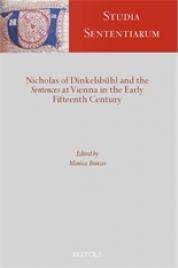This volume examines the faculty of theology of the University of Vienna after the new institution produced its first students. Taking Nicholas of Dinkelsbühl as our guide to this nascent academic milieu, the five contributors illuminate the university system at Vienna, describe the evolution of doctrine, identify the network of professors that developed the specific curriculum, and trace the reception of the academic writings outside the university. Traditionally the history of medieval universities is based primarily on statutes, cartularies, or other documents relating to the organization of the university as an institution. The present studies instead inspect the underside of the iceberg and penetrate the academic context of Vienna by reading and editing the texts issuing from the practice of teaching. The papers gathered here shed new light on the main pedagogical protagonists, measure the impact of the transmission of ideas between the Universities of Paris and Vienna, and provide access to the community of scholars to whom this material was addressed.
Monica Brinzei is currently directing the ERC project THESIS at the IRHT in Paris.
Sommaire
- Monica Brînzei, Introduction
- Christopher Schabel, Nicholas of Dinkelsbühl and the Filioque at Vienna in the Early Fifteenth Century
- Ueli Zahnd, Plagiats individualisés et stratégies de singularisation. L'évolution du livre IV du commentaire commun des Sentences de Vienne
- William Courtenay, From Dinkelsbühl Questiones Communes to Vienna Group Commentary. The Vienna School, 1415-1425
- Monica Brînzei, La Lectura Mellicensis de Nicholas de Dinkelsbühl dans le sillage de l'esprit reformateur de Jean Gerson
- Adinel Dinca, Reading Nicholas of Dinkelsbühl in Medieval Transylvania: Surviving Texts and Historical Contexts.

